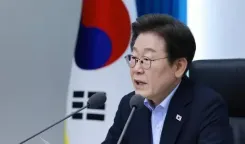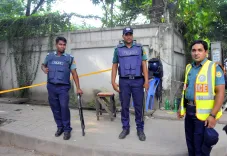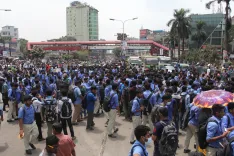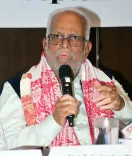Did Lee Jae-myung Just Become South Korea's New President Amidst Martial Law Chaos?
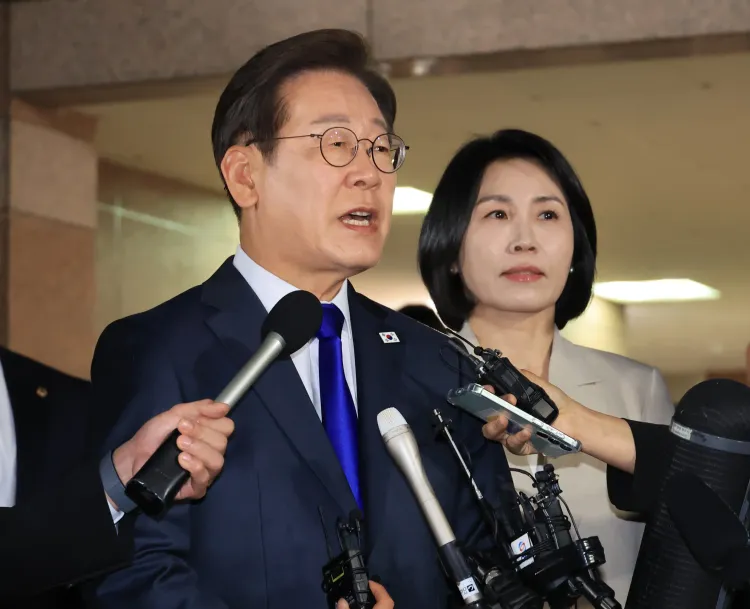
Synopsis
Key Takeaways
- Lee Jae-myung elected as South Korea's President.
- Election followed months of political turmoil and martial law.
- Lee received 49.42% of the vote, defeating Kim Moon-soo.
- Highest voter turnout since 1997 with 79.4%.
- Lee promises to revitalize the economy and ensure democracy.
Seoul, June 4 (NationPress) Democratic Party (DP) candidate Lee Jae-myung was elected as the President on Wednesday, following a period of upheaval stemming from the impeachment and removal of his former adversary due to a failed attempt to enforce martial law.
Lee's victory marks a significant comeback after narrowly losing to former President Yoon Suk Yeol by less than 1 percentage point in the 2022 election.
The attempt by Yoon to impose martial law in December not only facilitated Lee's ascent to the presidency but also exacerbated the political divide within the nation, intensifying challenges related to U.S. tariff policies and North Korea's advancing nuclear arsenal, according to reports from Yonhap news agency.
With all votes tallied, Lee from the liberal DP received 49.42% of the vote, while his conservative opponent, Kim Moon-soo from the People Power Party (PPP), garnered 41.15%.
Lee secured 17.3 million votes, defeating Kim by 2.9 million votes and achieving the highest vote count in a presidential election, surpassing Yoon's 16.39 million votes in 2022.
In a speech delivered in Yeouido, the location of the National Assembly, Lee vowed to "overcome the insurrection" and ensure that no "military coup" occurs, alluding to Yoon's martial law attempt.
"I will dedicate myself to creating a world where democracy is restored and the people are recognized as sovereign in a democratic republic, fostering cooperation among all," he stated alongside his wife, Kim Hye-kyung.
Upon being confirmed as the president-elect, he pledged to devote his efforts to revitalizing the economy and improving the lives of citizens.
PPP candidate Kim acknowledged his defeat in a press conference, expressing his respect for the electorate's decision while congratulating Lee.
Thanking the populace for their support, he recognized their resilience amid ongoing crises.
The election occurred precisely six months after Yoon's unexpected declaration of martial law, which revived troubling memories of past military regimes and plunged the country into its most severe economic and political turmoil in decades.
Lee campaigned on a promise to confront the "insurrection forces" led by Yoon, following the latter's impeachment and removal from office less than three years into a five-year term.
Kim capitalized on Lee's ongoing legal challenges and assertive leadership style to advocate for a future free from "dictatorship."
As exit polls indicated a victory for Lee by a 12.4 percentage point margin, DP campaign officials erupted in celebration within the National Assembly's situation room.
"I believe the sovereign people have rendered a harsh judgment on the insurrection regime," stated Rep. Park Chan-dae, head of the DP election committee, to KBS.
Conversely, PPP officials appeared despondent as their hopes for an upset victory dwindled.
"I anticipated a close race within the margin of error, so it's disheartening to see such a significant gap," said Rep. Na Kyung-won, co-head of the PPP election committee.
Of the 44.39 million eligible voters nationwide, approximately 35.24 million, or 79.4%, participated in the election, marking the highest turnout since the 1997 election.
The provisional tally included votes from 14,295 polling stations across the country, encompassing early voting, overseas, shipboard, and absentee ballots.
Voter enthusiasm surged during the snap election, with 34.74% of registered voters casting ballots during early voting, the second-highest figure since early voting was introduced in 2014.
Vote counting commenced immediately after polls closed at 8 p.m. and concluded around 6 a.m. on Wednesday, according to the NEC.
After finalizing the vote count, the NEC held a plenary session to confirm Lee's victory.
Since the election was expedited to replace Yoon, Lee assumed office immediately without a transition phase.
The inauguration ceremony is anticipated to occur later in the day at the National Assembly.
Five candidates contended for the nation's highest political office, with two withdrawing from the race during the campaign.
Besides Lee and Kim, other candidates included Lee Jun-seok from the New Reform Party, Kwon Young-guk from the Democratic Labor Party, and independent Song Jin-ho.
Surveys prior to the nationwide polling blackout last week indicated Lee maintaining a comfortable lead of around 10 percentage points over Kim, although the gap had narrowed in recent weeks.
Lee's support was in the 40% range, followed by Kim in the 30% range and approximately 10% for Lee Jun-seok.
Both candidates prioritized economic growth as their top campaign promise, particularly focusing on fostering the artificial intelligence sector.
On security matters, Lee committed to pursuing "pragmatic" diplomacy in response to the evolving global landscape, while Kim emphasized the need for strong deterrence against North Korea's nuclear threats.
Lee and Kim concurred on the necessity to amend the Constitution to transition from a single five-year presidential term to a four-year, two-term system.
Kim proposed shortening his own term to three years, aligning it with the terms of National Assembly members starting in 2028.
However, Lee urged for a referendum on constitutional amendments, suggesting the changes take effect in 2030.
While both main contenders participated in early voting, other significant political figures voted on Election Day.
Former President Yoon and his wife, Kim Keon Hee, cast their votes at a polling station in southern Seoul.
National Assembly Speaker Woo Won-shik voted in northern Seoul, expressing hope that the election would lead the nation out of the political "chaos" and towards a "democratic society."


